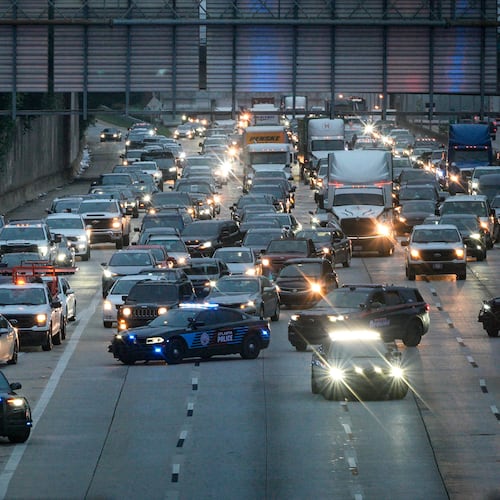My beautiful wife Momo and I took a delayed second honeymoon to Honolulu in October. Hawaiians battle some of the same traffic headaches Georgians do, especially in the island paradise’s capital. But Momo and I loved the phrase we heard both from one of Honolulu’s TV traffic reporters and saw on one of their traffic messaging signs: “Drive with Aloha.” That peaceful, disarming, and happy mentality embodies both selflessness and self-awareness. It is a discipline that takes conscious effort, not a subconscious and Zen-like becoming of one with the car or the road. This philosophy applies to both how we turn our pretty wheels and how we maintain our vehicles these holidays.
The recent North Georgia temperature-plunge is a great reminder of the strain such weather puts on our cars. Ice patches or snow trip us up, delaying and potentially hurting ourselves and others. So we have to proceed with caution when conditions turn.
But arctic drops do just as much damage to parked vehicles and in a far quieter way. The WSB Traffic Team and I notice a few more car fires in cold weather than in other times. Overall car maintenance is more to blame than just the temperatures, but frigid air can wear more parts.
“Fuel lines get brittle because the weather gets cold - and cracking and allowing fuel to go out onto a hot exhaust manifold,” local Porsche mechanic Adrian Guyton told the AJC and 95.5 WSB. “Other flammable fluids you have in your engine compartment, they run through hoses. Hoses can get brittle when it gets colder.”
And once the volatile fluids, such as power steering, hit a hot engine block, they can go kablooey. Auto fires inconvenience and endanger both drivers and surrounding vehicles, especially when they ignite in the heat of rush hour.
So taking vehicles in for their regular oil changes and checkups is the number one way to check hoses and other components. Guyton said some mechanics cut corners and add too much water to windshield cleaner reservoirs, which then can freeze and cause expensive damage. So Guyton recommended making sure that mechanics are adding enough wiper fluid and are checking wiper blades for any damage.
In the same vein, Guyton also said to make sure all fluids are correctly mixed and topped off during routine maintenance. If, say, the coolant does not have enough antifreeze mixed-in, then the coolant can freeze. This can lead to cracks in the engine block and eventually the vehicle stalling. He said that paying for a flush of a vehicle’s different systems is the best way to battle that.
For those that can park outside and potentially get icy windows, Guyton recommended pulling back wiper blades from the windshield and not using wipers to clear ice. He said people should instead use the defroster to melt the ice and then the wipers to clear the melted water. Another solution is also to keep an ice scraper in the car - even in the South.
Guyton had a laundry list of items that cold weather can harm. Batteries lose power and need checking. Putting heaters and defrosters on full blast can accelerate the slow deaths of batteries and alternators and those surprise breakdowns put big wrenches in plans. Guyton also advises to check tire pressures during a cold snap (on the spare, also) and then keep checking them once per week, as cold weather decreases the psi.
Then there are the items that Guyton said motorists should always have, especially in cold weather. Keep a set of jumper cables, in case of battery issues. Lithium-ion battery starters, which can jumpstart a battery without another car, are even better. Those can run for under $100 and can keep a long charge.
And 2014′s Snowmageddon disaster should not be a distant memory at all, as thousands found themselves stranded on Metro Atlanta’s icy roads, absolutely gridlocked. Then-Gridlock Guy, Mark Arum compiled a thorough and brilliant list of emergency items to keep in the car, including a full change of clothes, prescription meds, garbage bags and a sealable waste container (for...you know), and other hygiene items. Guyton offers the basics, too, “Maybe some water, and some snacks, an emergency blanket,” also adding one of the most important items: a phone charger.
And we need our cars to keep warm, if we get stuck on icy roads. “Always keep at least a half-tank full of gas in your car, so that you can idle for a while, if you need to,” Guyton said. This, of course, buys time until the roads clear or assistance arrives. Making sure you know what kind of roadside assistance your insurance or manufacturers have is also a great tool of preparation. I have paid for AAA since 2007 and they have bailed me out many times.
A vehicle with perfect maintenance is still at the mercy of its pilot. The Georgia State Patrol said Thanksgiving travel weekend crashes killed 24 statewide. If we don’t choose to drive sober, with less distractions, with lower aggression, and higher awareness of others, then car maintenance and emergency prep don’t matter.
“Share the Shaka” is a way Hawaiians say hello. They extend the thumb and pinky, with the other three fingers down give a slight, y-shaped wiggle. That’s “aloha” and we hopefully can agree that sharing two digits is better than one. Car maintenance and smart driving are keys to an efficient, safe, and peaceful holiday travel season. Whether in the tropics or the tundra, Drive with Aloha and Share the Shaka.
Doug Turnbull, the PM drive Skycopter anchor for Triple Team Traffic on 95.5 WSB, is the Gridlock Guy. He also hosts a traffic podcast with Smilin’ Mark McKay on wsbradio.com. Contact him at Doug.Turnbull@cmg.com .
About the Author
The Latest
Featured

